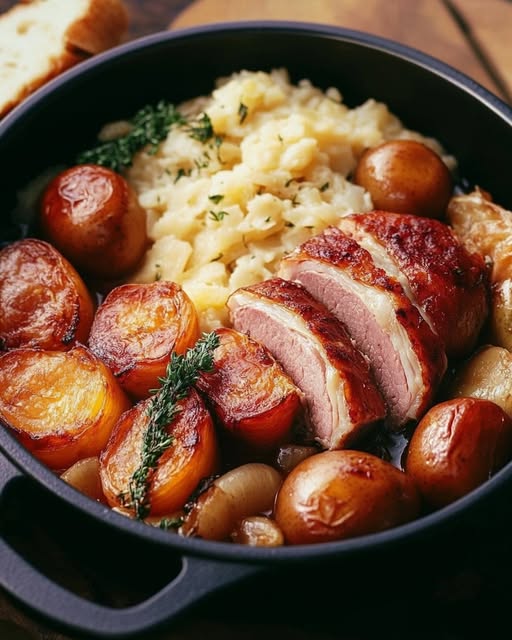Why I Love Making Savory Sauerkraut Feast
Last winter, I decided to tackle a dish I’d always admired but never dared to make: Savory Sauerkraut Feast. It felt like one of those recipes reserved for grand family gatherings in cozy alpine cabins. But guess what? It turned out to be simpler than I imagined, and the flavors were absolutely divine. The mix of tangy sauerkraut, tender meats, and aromatic spices made my kitchen smell like a holiday market in Alsace. This recipe is perfect if you want to impress your guests or just treat yourself to something hearty and comforting.
A Little History of Choucroute Garnie
Savory Sauerkraut Feast, or Choucroute Garnie, hails from the Alsace region of France, where French and German culinary traditions blend beautifully. Historically, it was a way to preserve cabbage through fermentation during harsh winters. Over time, people added meats like sausages, pork, and smoked bacon to turn this humble dish into a feast. My grandmother used to say that every Alsatian family has its own version, passed down through generations. I’ve tried a few variations myself, but this recipe strikes the perfect balance between tradition and modern tastes.
Why You’ll Fall in Love with This Recipe
This dish is all about bold flavors and simplicity. The sauerkraut softens as it cooks, absorbing the rich juices from the meats and wine. Each bite bursts with savory goodness, balanced by the slight tang of fermented cabbage. Plus, it’s incredibly forgiving. Even if you’re not a pro in the kitchen, you can pull this off with ease. The best part? It’s a one-pot wonder, so cleanup is a breeze. Trust me, once you try it, you’ll want to make it again and again.
Perfect Occasions to Prepare This Dish
If you’re hosting a dinner party, this Savory Sauerkraut Feast is a showstopper. It’s also ideal for cold winter nights when everyone craves something warm and filling. I’ve served it at Thanksgiving as an alternative to turkey, and my friends still rave about it. It’s equally great for casual Sunday lunches or even potlucks. Just bring it in a big dish, and watch it disappear!
Ingredients for 6 People
- 1 kg raw sauerkraut (uncooked)
- 1 onion
- 1 garlic clove
- 4 cloves
- 1 bay leaf
- 1 teaspoon cumin seeds (optional)
- 6 medium potatoes
- 4 carrots
- 300 g smoked bacon
- 4 Strasbourg sausages or knackwurst
- 4 Montbéliard sausages
- 2 salted pork knuckles
- 200 g smoked pork belly
- 50 g lard or rendered fat
- 1 glass dry white wine (Riesling or Sylvaner)
- 1 glass water or broth
- Salt and pepper to taste
Substitution Options
If you can’t find some ingredients, don’t worry! For example, you can swap Montbéliard sausages with any smoked sausage. Use chicken broth instead of water if you want extra flavor. If you’re not a fan of pork, try substituting beef or turkey. Vegetarians can use plant-based sausages and vegetable broth for a meat-free version. The key is to adapt the recipe to your taste while keeping the sauerkraut as the star.
Step 1: Preparing the Sauerkraut
Rinse the raw sauerkraut under cold water to remove excess salt. Drain it well and set aside. Peel the onion and stud it with the cloves. This step is crucial because rinsing the sauerkraut ensures it’s not overly salty, which could overpower the dish. Pro tip: Taste a small piece of sauerkraut before adding it to the pot. If it’s too tangy, rinse it a bit more.
Step 2: Cooking the Base Ingredients
In a large pot, melt the lard over medium heat. Add the clove-studded onion, bay leaf, garlic, and cumin seeds if using. Let them sizzle gently for a minute to release their aromas. Then, layer the sauerkraut evenly in the pot. Add the peeled and chopped carrots on top. The aroma at this stage is heavenly—earthy, spicy, and slightly sweet. It sets the foundation for the entire dish.
Step 3: Simmering the Sauerkraut
Pour the white wine and water (or broth) over the sauerkraut. Bring it to a boil, then lower the heat and let it simmer for about 1.5 to 2 hours. Stir occasionally and add more liquid if needed. As it cooks, the sauerkraut transforms from sharp and crunchy to soft and mellow. The longer it simmers, the better it tastes. Chef’s tip: Use a wooden spoon to stir—it won’t scratch your pot and feels rustic!
Step 4: Cooking the Meats
While the sauerkraut simmers, cook the salted pork knuckles in boiling water for about 1.5 hours until tender. In another pot, boil the potatoes whole with their skins for about 20 minutes. The knuckles will become fall-off-the-bone tender, while the potatoes stay firm yet creamy inside. Imagine the steam rising as you lift the lid—it’s pure comfort food magic.
Step 5: Adding the Charcuterie
After the sauerkraut has cooked for 1.5 hours, nestle the smoked pork belly and Montbéliard sausages into the pot. Let them simmer for another 30 minutes. Ten minutes before serving, add the Strasbourg sausages to warm them through. This step ensures all the meats are infused with the sauerkraut’s flavor. The sight of these succulent sausages nestled in golden sauerkraut is enough to make anyone hungry.
Step 6: Assembling and Serving
Once everything is cooked, arrange the sauerkraut on a large platter. Place the meats, sausages, and boiled potatoes around it. Serve hot with mustard and a glass of Alsatian wine. Presentation matters here—a sprinkle of fresh parsley adds a pop of color. Your guests will feel like they’re dining at a Michelin-starred restaurant!
Timing Breakdown
- Preparation Time: 20 minutes
- Cooking Time: 2 hours
- Total Time: 2 hours 20 minutes
Chef’s Secret
For an extra layer of flavor, brown the meats briefly in the pot before adding the sauerkraut. This caramelization adds depth and richness to the dish. It’s a little extra effort that pays off big time.
Extra Info
Did you know that sauerkraut is packed with probiotics? These good bacteria are great for gut health. So, not only is this dish delicious, but it’s also good for you!
Necessary Equipment
- Large pot or Dutch oven
- Wooden spoon
- Kitchen knife and cutting board
- Colander for rinsing sauerkraut
Storage Tips
To store leftovers, transfer the cooled dish to an airtight container and refrigerate for up to 3 days. Reheat portions gently on the stovetop, adding a splash of broth to keep the sauerkraut moist. Freezing isn’t recommended, as the texture may change upon thawing.
If you plan to freeze individual components like cooked sausages or pork knuckles, do so separately. They’ll retain their quality better than the assembled dish.
Always label containers with the date to ensure freshness. Proper storage keeps the flavors intact and prevents spoilage.
Tips and Advice
Use high-quality sauerkraut for the best results. Opt for natural, unpasteurized varieties if possible. Don’t rush the simmering process—the longer the sauerkraut cooks, the tastier it gets. Serve with crusty bread for soaking up the juices.
Presentation Ideas
- Garnish with fresh herbs like parsley or chives.
- Serve in individual cast-iron skillets for a rustic touch.
- Add edible flowers for a festive look.
Healthier Alternatives
Here are six ways to lighten up your Savory Sauerkraut Feast:
- Turkey Sausages: Replace pork sausages with lean turkey ones.
- Less Fat: Skip the lard and use olive oil instead.
- Veggie Option: Swap meats for plant-based proteins like tofu or tempeh.
- Low-Sodium: Choose low-salt sauerkraut and broths.
- Smaller Portions: Reduce the amount of meat per serving.
- More Veggies: Add zucchini or mushrooms for extra nutrition.
Mistake 1: Skipping the Rinsing Step
Many beginners skip rinsing the sauerkraut, thinking it’s unnecessary. However, failing to rinse can result in an overly salty dish. Always rinse the sauerkraut under cold water and taste it beforehand. Pro tip: Save some of the brine to adjust acidity later.
Mistake 2: Overcooking the Sausages
Overcooking sausages makes them tough and dry. To avoid this, add delicate sausages like Strasbourg ones towards the end of cooking. They only need 10 minutes to heat through.
Mistake 3: Not Stirring Enough
Neglecting to stir the sauerkraut can cause it to stick or burn. Stirring distributes moisture evenly and enhances flavor absorption. Set a timer to remind yourself to check the pot regularly.
FAQs
What is Choucroute Garnie?
It’s a traditional Alsatian dish featuring sauerkraut cooked with various meats and vegetables. Known for its hearty and flavorful profile, it’s often served during celebrations.
Can I make it vegetarian?
Absolutely! Substitute meats with plant-based alternatives and use vegetable broth. Mushrooms work wonderfully as a meat substitute.
How long does it last in the fridge?
Stored properly, it lasts up to 3 days. Reheat gently to maintain texture and flavor.
Do I have to use wine?
No, you can replace wine with additional broth. However, wine adds a unique depth of flavor.
Is sauerkraut healthy?
Yes, it contains probiotics beneficial for digestion. Just opt for low-sodium versions if watching your salt intake.
Can I prep it ahead?
Definitely! You can prepare components like cooked sausages and sauerkraut a day in advance.
What sides pair well?
Crusty bread, mashed potatoes, or a simple green salad complement the dish beautifully.
Why is my sauerkraut too salty?
You likely skipped rinsing it. Always rinse raw sauerkraut to reduce saltiness.
Can I freeze leftovers?
Freezing isn’t ideal, as textures may change. Store components separately if freezing.
What type of mustard goes best?
Dijon or coarse-grain mustard pairs perfectly with the dish’s robust flavors.
Final Thoughts
There’s something magical about making Savory Sauerkraut Feast. Whether you’re cooking for loved ones or treating yourself, this dish brings warmth and joy to any table. With its rich history, bold flavors, and comforting appeal, it’s no wonder it remains a beloved classic. So grab your apron, gather your ingredients, and get ready to create a meal that will leave everyone asking for seconds!

Savory Sauerkraut Feast
Ingredients
Equipment
Method
- Rinse the raw sauerkraut under cold water to remove excess salt. Drain well and set aside.
- Peel the onion and stud it with the cloves.
- In a large pot, melt the lard over medium heat and add the clove-studded onion, bay leaf, garlic, and cumin seeds if using.
- Layer the sauerkraut evenly in the pot and add the peeled and chopped carrots on top.
- Pour the white wine and water (or broth) over the sauerkraut, bring to a boil, then lower the heat and let it simmer for about 1.5 to 2 hours.
- Cook the salted pork knuckles in boiling water for about 1.5 hours until tender.
- Boil the potatoes whole with their skins for about 20 minutes.
- After 1.5 hours of simmering, nestle the smoked pork belly and Montbéliard sausages into the pot and let them simmer for another 30 minutes.
- Ten minutes before serving, add the Strasbourg sausages to warm them through.
- Arrange the sauerkraut on a large platter and place the meats, sausages, and boiled potatoes around it. Serve hot with mustard and a glass of Alsatian wine.
